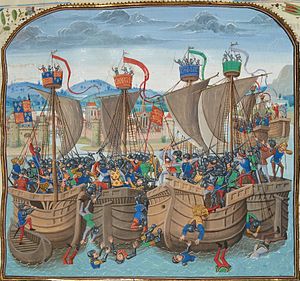Battle of Sluys
| Battle of Sluys | |||||||
|---|---|---|---|---|---|---|---|
| Part of the Hundred Years' War | |||||||
 A miniature of the battle from Jean Froissart's Chronicles, 14th century |
|||||||
|
|||||||
| Belligerents | |||||||
|
|
|
||||||
| Commanders and leaders | |||||||
|
|
Nicolas Béhuchet † |
||||||
| Strength | |||||||
| 120 – 150 ships | 190–213 ships | ||||||
| Casualties and losses | |||||||
| Unknown. Estimate: Small loss. | 16,000–18,000 The (Hundred Years' War (Fr) by Georges Minois) to 20,000 (Europe: A History by Norman Davies) Most ships captured |
||||||
The Battle of Sluys (/ˈslɔɪz/; Dutch pronunciation: [slœys]), also called Battle of l'Ecluse, was a sea battle fought on 24 June 1340 as one of the opening conflicts of the Hundred Years' War between England and France. The encounter happened during the reigns of Philip VI of France and Edward III of England, in front of the town of Newmarket or Sluis (French Écluse), on the inlet between West Flanders and Zeeland. During the battle Philip's navy was almost completely destroyed, giving the English fleet complete mastery over the channel. However, by the end of Edward's reign the French had rebuilt their fleet and were to become a threat again.
When France's Charles IV the Fair died in 1328 leaving only daughters, his nearest living male relative was Edward III of England. The French establishment did not want the English king on the French throne, and chose Edward's cousin, Philip, Count of Valois, to be king of France instead. The English kings had become dukes of Aquitaine after Henry II of England married Eleanor of Aquitaine in 1152, from which point the lands in Aquitaine were held in vassalage to the French crown. Edward III did not see himself as subordinate to Philip and was reluctant to be Philip's vassal. Philip confiscated the lands that Edward held in Aquitaine, on the grounds that Edward had breached his obligation as vassal, precipitating what became known as the Hundred Years' War in 1337.
...
Wikipedia
